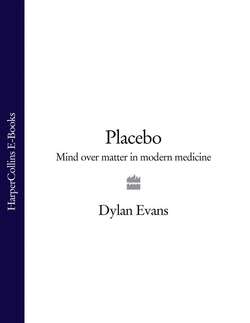Читать книгу Placebo: Mind over Matter in Modern Medicine - Dylan Evans - Страница 8
PLACEBOS BECOME RESPECTABLE
ОглавлениеIn 1955, Beecher summed up the new view of placebos in an influential article published in the Journal of the American Medical Association.5 Entitled ‘The Powerful Placebo’, the article claimed that placebos could ‘produce gross physical change’, including ‘objective changes at the end organ which may exceed those attributable to potent pharmacological action’. Placebos, in other words, had real effects on real bodies. No longer were sugar pills to be dismissed as a harmless but ineffectual sop given to please hypochondriacs and desperate people. The placebo effect was born.
Beecher’s article has been enormously influential. Fifty years after publication, it is still regularly cited in almost every scientific paper on the placebo effect, and even those that do not cite it directly usually repeat its claims without acknowledgement, or refer to papers that do cite it. It is unlikely, however, that all of those who refer to it have bothered to read it; if they had done, they might not be quite so enthusiastic. For one thing, the range of conditions that Beecher claims can be affected by placebos is not very extensive. Most of the studies he reports concern the effects of placebos on various forms of pain – postoperative pain, pain from angina and headache. The only other medical problems mentioned are cough, common cold, seasickness and anxiety, and for each of these Beecher mentions only one study. More importantly, none of the studies he refers to provides any real evidence at all for the existence of a placebo effect.
The reason why these early studies provide no evidence of a placebo effect is that, with one exception, all failed to include a control group who received no treatment. In any group of people suffering from a particular condition, some will get better without any medical help. To provide convincing evidence of a placebo effect, you would have to show that those receiving the placebo did significantly better than those who received no treatment at all. Yet almost all the studies cited by Beecher merely show that some of those who received a placebo – a third, on average – felt better afterwards. Without a no-treatment control group to compare it with, this figure is meaningless. The improvement shown by those who received the placebo might well have occurred anyway, even if they had received no placebo. The one study that did include a no-treatment group found no difference between it and the placebo group.
The authors of the original studies did not think they had found any evidence of placebo effects. A few of them even said so explicitly. They realised that the improvement shown by those receiving placebos could easily be accounted for by the natural course of the disease (spontaneous remission, random fluctuation of symptoms and so on) and various other factors such as additional treatments. In one of the studies, for example, 35 per cent of the patients with mild colds felt better within two days of taking a placebo (or six days after the start of their cold). The authors of the study pointed out that many patients with a mild cold get better within six days even if they receive no medical treatment at all. Beecher, however, ignored this remark, and attributed all the improvement shown by these patients to the fact that they had taken a placebo.
Besides spontaneous remission, other factors also play a part in the improvement shown by patients receiving placebos. In one study cited by Beecher, for example, patients with a variety of conditions were treated for anxiety and tension. After four months, during which they were given two-week courses of an anti-anxiety drug called mephensin and placebo alternately, between 20 and 30 per cent of them improved. However, another 10–20 per cent of patients deteriorated. The authors of the study subtracted the deterioration rate from the improvement rate and reported, correctly, a net improvement of around 10 per cent. Considering the rather long observation period of sixteen weeks, this seems quite a low figure, especially when one considers that the patients had taken an active drug for eight of the sixteen weeks. Some of them may also have received other medical support outside the context of the study. Yet Beecher failed to take the deterioration rate into account, and claimed that the study showed a placebo effect of 30 per cent.
In fact, Beecher misquoted ten of the fifteen trials he cited – including one which he had co-authored himself.6 His cavalier attitude in reporting these studies is paradoxical, since his underlying objective in marshalling evidence for the placebo effect was to persuade medical researchers to be more rigorous in their approach to evaluating new treatments. Before World War II, the evaluation of new therapies was largely determined by the personal judgement of distinguished doctors. Beecher was a leading figure in the movement to reform this long tradition. Along with Gold and others, he argued vigorously that medical treatments could best be tested by a new method: the randomised, placebo-controlled clinical trial.
